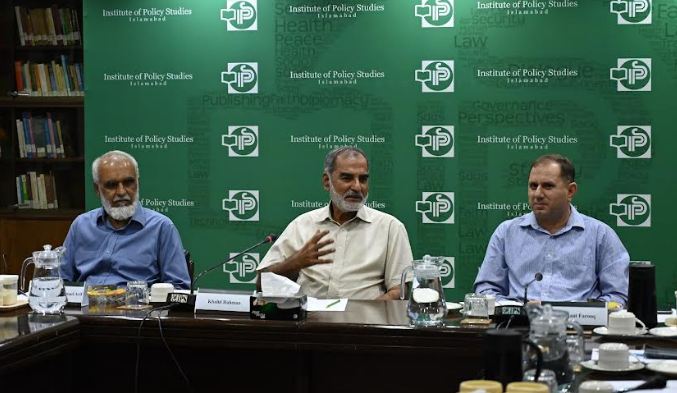ISLAMABAD, OCT 23 /DNA/ – Pakistan must adopt a strategic shift in social protection policies to tackle poverty and unemployment, with a sustained and responsive 8% economic growth rate over 8-10 years identified as essential to generating sufficient job opportunities.
Achieving this requires a growth-oriented, inclusive, and data-driven approach, alongside comprehensive structural reforms. Key measures include decentralizing program management and prioritizing human capital development to transform social safety efforts into sustainable economic progress.
This was discussed during an interactive session on “Poverty Alleviation in Pakistan: Examining the Concept and Performance of BISP” held at the Institute of Policy Studies (IPS), Islamabad. The event, chaired by Dr Ghulam Muhammad Arif, former dean, Pakistan Institute of Development Economics (PIDE), featured insights from Dr Shujaat Farooq, chief of research, PIDE, Khalid Rahman, chairman, IPS, and other experts.
The session critically examined the current state of poverty alleviation efforts in Pakistan, with a focus on the Benazir Income Support Programme (BISP), its effectiveness, and the broader structural challenges facing the country’s social protection programs.
Dr Shujaat Farooq explained that BISP, despite being a significant social safety net, has become heavily donor-driven, with conditions from international organizations like the IMF. This has made it challenging for the government to modify or discontinue the program, despite its limitations, as it has not had a positive impact on poverty alleviation even after 16 years.
He noted that BISP’s current budget, Rs 600 billion, is substantial, but without creating long-term economic opportunities, it remains a temporary relief measure rather than a solution for poverty alleviation.
He pointed out significant data management issues within BISP, where billions in funds are being spent without effective tracking or uniform data usage. Moreover, there is a considerable disparity between national-level data and ground realities, which leads to inaccuracies in identifying and targeting the most vulnerable populations.
The discussion also underscored the manipulation of data by third-party evaluators and NGOs, reducing the reliability of program assessments. Furthermore, over time, embezzlement at the disbursement level and rising operational costs have made the program even less effective.
The panel agreed that the country lacks a consistent social protection strategy. While programs like BISP play a critical role, they are not sufficient by themselves to lift people out of poverty. The lack of improvement in primary education and high fertility rates, along with low access to medical facilities, continue to exacerbate poverty challenges. As such, addressing education and health service gaps is necessary.
The discussion also touched upon the inefficiencies in past initiatives and recent microfinance programs that have fallen short in reducing poverty sustainably. Moreover, the role of international donor agencies was deemed to be suspicious in poverty alleviation. The experts called for a shift in focus, prioritizing actual outcomes over obtaining easy grants or soft loans. They highlighted the importance of integrating government programs to create a cohesive framework that enables a clear path out of poverty, with a better-defined and communicated concept of “graduation” from poverty.
The discussion also identified three major structural issues hindering poverty alleviation: the problematic National Finance Commission award formula that incentivizes poverty without fostering growth, the centralized administration of programs that should have provincial ownership, and the short-term tenure of secretaries who lack ownership of program outcomes.
Decentralizing program management, establishing clear inclusion criteria, and developing strategies to foster human capital were suggested as crucial reforms. Experts recommended a comprehensive plan that addresses chronic, transient, and urban poverty, with tailored interventions for each.
To address the opportunity crisis, the experts stressed the importance of investing in human capital and infrastructure, especially in regions with high potential but limited resources. Skill development programs must be designed to genuinely empower youth and enhance their employability while addressing the mismatch between training programs and workforce demands.
Khalid Rahman emphasized that BISP’s reliance on external conditions over internal strategy must change, advocating for evidence-based discussions to shape more effective social protection policies.
He highlighted that while BISP remains a key social safety net, its continuation has been driven more by external conditions than by a robust internal strategy. The challenges that Pakistan is facing can be addressed by growth-oriented, inclusive social protection policies that drive sustainable economic progress, alleviate poverty, and create lasting job opportunities across Pakistan.

















